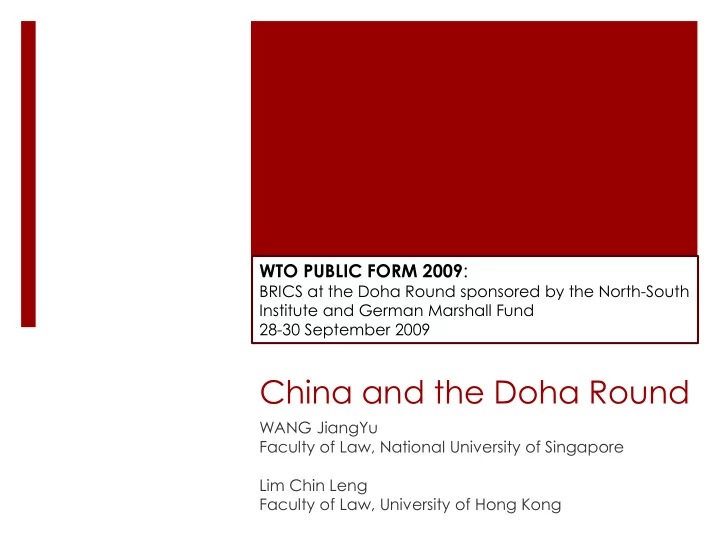

WTO PUBLIC FORM 2009 : BRICS at the Doha Round sponsored by the North-South Institute and German Marshall Fund 28-30 September 2009 China and the Doha Round WANG JiangYu Faculty of Law, National University of Singapore Lim Chin Leng Faculty of Law, University of Hong Kong
1. China and Doha: A Brief History China joined the WTO in 2001, after 15 years of arduous negotiation Motives: Economic Trade development and foreign trade relations Domestic reform agenda Participation in rule-making in international trade
“Being able to participate in global trade rules making was another motive for the Chinese to join the WTO …. China hopes to re -write some of the rules of the game …” Furst (2001) WTO accession could make China “a leader of diplomacy, with a potential for coalition- seeking”.
Economic performance after China’s WTO accession 2001 2009 7 th largest economy Since 2007, the third largest economy 7 th largest exporter and 8 th 2 nd largest exporter (since largest importer 2008), and 3 rd largest importer
Performance in the negotiations Just cool! Active in some negotiations, but has not sought to assume leadership as expected by many Comfortably sit the backseat in many other negotiations Urged by its major trading partners to assume a level of global responsibility that matches its heavy weight in international trade Confused and worried a bit.
“Abnormal” performance in the 2008 Mini-Ministerial China and India were blamed for having “thrown the entire Doha Round into the gravest jeopardy” Chinese counterattack: “publicly accusing the US of hypocrisy for heavily subsidizing its own cotton farmers … while asking other countries to expose theirs to harsh competition” (Financial Times, 29 July 2008)
2. China’s Negotiating Positions General position: Jumped on the bandwagon of global trade talks Special treatment for new Members Four Ls: less (requests), lower (obligations), longer (transition periods), and latter (liberalization) Development dimension
On selected issues NAMA: tariff reduction with special treatment for developing countries, especially the RAMS; a slight variation of the Swiss Formula Services: China is relatively more active in services negotiations but has indicated it would not be in a position to offer substantial concessions Rules negotiations: China has a keen interest in seeking clarification and improvement of the existing rules Development and S&D: mildly support
3. China’s as a BRICs country Yielded leadership to Brazil and India Member of G20, and G33 Emerged as a central player during 2008 mini- ministerial
4. Impact of the Global Crisis The crisis is a huge blow to China’s export: continuous decline since November 2008 Dropped by about 18% in January 2009, 23.4% in August 2009 “the biggest victim of the rising global trade protectionism” Two conflicting lessons for China The best medicine seems to be multilateral liberalization. China has said this Over-reliance on foreign trade questioned domestically Serious measures taken to stimulate domestic consumption with a US$585 billion economic plan
Already one of the largest importers and key export destination for Asian economies, China is likely to become a trade-deficit country in the years to come, “thanks to the rising income levels and government stimulus on the nation’s consumption” (CLSA Asian -Pacific Markets, 2009) The biggest importer of a range of products Profound implications if China eventually becomes a deficit country
5. Other factors affecting China’s negotiating positions (1) The benefits of the multilateral system (2) Domestic politics (in light of the over-committed obligations during WTO accession) (3) Regionalism as a backup (4) Trade litigation as an additional policy device (5) Relationship with developing countries (6) Power-based bilateral solutions (7) Institutional capacity (8) Development strategy
6. Conclusion China will continue to take a middle-position, using its existing offers and its status as a RAM as a shield against pressure and criticism
Thanks again to the WTO, the North South Institute and the German Marshall Fund for the invitation. Special thanks to Pablo Heidrich for his meticulous organizational work and helpful comments on our paper.
Recommend
More recommend